Fresh details emerge of how Njoro man pictured being carried in blanket died
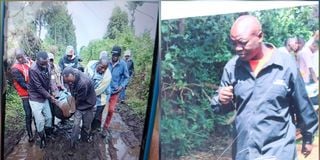
(Left) Viral photo of Geoffrey Maritim being ferried to the main road by close to eight men, taking turns on August 16,2025. (Right) Photo of a healthy Geoffrey Maritim before his death.
At her home in Chepkosa village, Mauche ward, Njoro sub-county, Mrs. Florence Maritim clutches the two checked blankets that carried her husband’s frail body on his final journey from their home, less than a kilometer from the main road.
With deep sorrow, she says she feels abandoned by a government that has failed to provide even the most basic of services.
Her husband, Geoffrey Maritim, 45, who had been battling high blood pressure and diabetes, fell ill on the night of August 16. His pressure had risen dangerously, and he needed urgent medical attention.
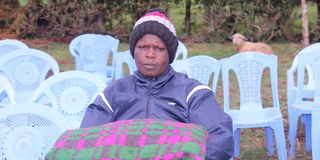
Mrs. Florence Maritim clutches the two checked blankets that carried her husband’s frail body on his final journey from their home on August 19,2025.
Neighbors tried to find a vehicle to take him to the hospital, but the heavy rains had rendered the road impassable.
Cars refused to enter the village, and by the next morning, the family had no option but to carry him on the blankets.
“A group of about ten men were taking turns,” she recalls. “If we had a good road, we would have been helped.”
Mr. Maritim had lived with the illness for five years, often going for check-ups. His wife notes that his health had improved in the past years.
But the delay in getting him to the hospital that night worsened his condition, and he died before receiving medical attention.
As we head into Mrs. Maritim’s home, a lorry ferrying cabbages struggles just meters from her home.
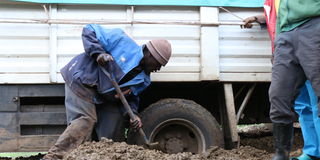
Man helps to dig out mud underneath the lorry ferrying cabbages into the road that leads to Mrs. Maritim's home on August 19,2025.
Men caked in mud were forced to carry the produce through a slippery path after the truck was unable to get to the farm and got stuck twice, barely 200 meters from the main road.
It is a scene that mirrors the same inaccessibility that cost her husband’s life.
Pictures of men carrying Mr. Maritim on the blankets quickly spread on social media, evoking outrage and sympathy from residents and non-residents alike. Many questioned how poor roads continue to deny communities access to life-saving health care.
For Mrs. Maritim, the pain remains personal. She is left a widow, holding the blankets that tell the story of a life lost not just to illness, but to neglect.
A few homesteads away, another family faced the same struggle. Just last week, a school-going girl went into labor, but the rains made the road impassable.
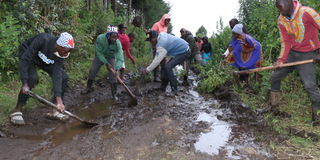
Men help dig out the road heading into Mrs. Maritim's home on August 19,2025.
Her uncle, village elder James Mutai, recalls that no vehicle could reach them that night. Hours later, a neighbor agreed to help, but the mother and her newborn twins had to be carried by women from their home to the road before they could be taken to the hospital.
The infants did not survive.
Mr. Mutai says their biggest challenge is the poor roads, which often put lives at risk, especially for the sick and expectant mothers during the rainy season.
“It is not the first time we have lost people because help cannot reach them,” he says. “Just the same month, we lost an elderly man, too. When politicians come here asking for votes, they drive straight to our doorsteps, but once elected, they vanish, and we are left to suffer.”
Cumulatively, Mr. Mutai says he has heard of nine similar cases, with three recent incidents ending in loss.
John Mutai, one of the men who helped ferry Mr. Maritim to the road, remembers how painful and exhausting the journey was.
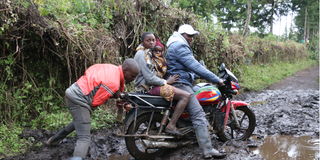
A passerby helps a bodaboda rider and a passenger through the muddy road into Mrs. Maritim's home on August 19,2025.
“After being called to help the previous night, we spent the night at their home, and when morning came, we set out to meet the vehicle that was waiting by the road. It took us nearly four hours, from around 7 a.m. to 10 a.m., with about eight of us wading through the mud and taking turns to carry Mr. Maritim,” Mutai recalls. He adds that young people are often forced to dig the roads during emergencies.
The angered residents now fault and shame their elected representatives, questioning why leaders can afford treatment abroad while those who elected them continue to lose lives for lack of access to the most basic of services.
